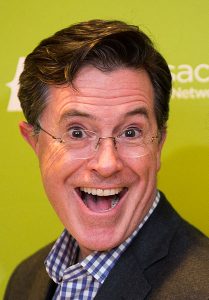For the humor project, we learned how to use comedy (both verbal and written form) to deliver a message about a critical issue. After reading works such as Kurt Vonnegut’s Slaughterhouse-Five and Eugene Ionesco’s “Rhinoceros”, we were tasked with creating a comedic act of our own.
Humorist Study
Stephen Colbert and Ronny Chieng are both well-known humorists — comedians, to be specific. Colbert’s piece, Trump Indulges His Penchant For Chanting Mobs By Tweeting Encouragement To Lockdown Protesters, and Chieng’s piece, Everything Is Stupid – Desperate Ideas for a Warming Planet, are both hilarious and work for different reasons. While Colbert’s piece regards Trump’s response to coronavirus and lockdown protestors, Chieng tackles potential climate change solutions.

The two themes in Colbert’s piece are that those protesting the lockdown are doing themselves a disservice, and that Trump’s behavior during this crisis is not indicative of a competent leader. Through a recorded presentation with graphics and video-clip inserts, Colbert communicates these themes using jokes, black humor, blue humor, and satire. At the beginning of his presentation, the comedian effectively captures the audience’s attention by joking, “I hope you had a lovely weekend. Actually, I hope you had a weekend. ‘Cause that means you can still differentiate the days of the week.” Because of this joke, the audience can feel more connected to him because of his lighthearted reminder that other people are having similar difficulties during this time period. In response to a photograph of a lockdown protestor wielding a sign reading “Give me Liberty or Give Me Covid-19,” Colbert exclaims, “buddy, you’re in a large crowd, you’re not wearing a mask, you’re not six feet away from people, you might not need to choose.” This criticism of lockdown protestors is an example of black humor since the protestor may very well catch coronavirus from their exercise of “liberty.” Colbert goes on to comment on the Paycheck Protection Program’s (PPP) failure to aid small businesses financially: “Evidently, the [PPP] to save small businesses… ran out of money on Thursday…that’s like your condom catching chlamydia.” His analogy, which utilizes blue humor, simultaneously points out the shortcomings of the PPP and highlights the inadequacy of the White House administration’s response to Covid-19.

While Colbert discusses a sickness affecting humans, Chieng addresses how best to tackle a sickness affecting the earth: climate change. His presentation with graphic inserts showcases how outlandish and frankly unfeasible some proposed solutions to climate change are mainly through dramatic irony and absurd humor. Chieng begins his piece with the following: “To help cool the planet… I turned the air conditioning on.” When questioned as to whether his actions were actually contributing to global warming, Chieng replied: “No, stupid, I left the window open, of course.” This example of dramatic irony prompts audience members to examine areas of their own lives in which a practice meant to help them avoid the fallout of an outcome actually contributes to that outcome. In his review of a startup’s idea to move ocean water into a desert to cool the earth, Chieng exclaims that one “can’t buy three boxes of Papa John’s and ask [one’s] friends to move the Atlantic [into the desert].” The absurdist humor in this statement emphasizes the ludicrousy of the startup’s idea.
The similarities between the two pieces include the media and clever lines. The recorded presentations with graphics and video clip inserts mimics what one might see on a TV news channel; this media style is effective in delivering the comedians’ messages since they are discussing current events or situations. Both Colbert and Chieng structured their lines such that people could laugh easily and then reflect on the deeper meaning behind what was just said. In that way, these two comedies were lovely.
Stephen Colbert’s Piece: www.youtube.com/watch?v=hIv7YJ0UrlM
Ronny Chieng’s Piece: www.youtube.com/watch?v=QooQ1pszp6I
Comedic Sketch Script
My family made the radical decision a few months ago to become vegetarians. Now, before you start congratulating me on my journey to being one with Mother Nature and all that, I’mma let you know that this was done against my will and I resent the fact that I was born into a family that wants to do good for the earth. What?! You want me to give up my dino nuggies?! But I do have to admit that giving up meat is better for the environment, what with reducing carbon footprints so I just went along with it.
Also, if you think about it, I’m not one of those good ol’ Americans scarfing down beese churgers on the daily, I’d be totally fine. On top of that I’m Vietnamese, and if you know anything about Vietnamese people it’s that we eat a truckload of vegetables. I’m talking like at least a 5:1 ratio of veggies to every other aspect of the meal, no joke. You go to any pho place and they slap down that platter of herbs and bean sprouts that white people always have no clue what to do with, yeah, that’s the good shit. Don’t be wasteful. Don’t just leave it there.
Speaking about being wasteful, part of being vegetarian is being eco-friendly and not wasting resources. So naturally when it came time for my family to clear the fridge of meat products, we didn’t just throw the stuff out. We ate it. Reduce the trash you produce, amirite?
Next we decided to get our protein through beans, lentils, tofu and tofu and… more tofu. Did you know that there’s such a thing as meatless meat? Yeah that’s a thing, like meatless patties and sausages and ground beef. Textured tofu is wild, man.
Alright so 1 month into this lifestyle the whole thing’s becoming a mess. Everyone in the family’s suffering from meat withdrawal. One moment we’re sitting at the kitchen table discussing what we need to stock up on at the grocery store and in the next, someone will whip out the ten commandments of vegetarianism. Then things devolve into a “who’s the better vegetarian” contest.
“No you can’t get almond milk because it takes too much water to produce almonds”
“No you can’t buy meatless meat the whole point of becoming vegetarian was to give up meat”
“No you can’t—”
ANYWAY it was inevitable but one of us cheated on the diet. That was me. Sorry.
Have you ever tried fish sauce? Gotdamn crack cocaine. I’m an addict, I know. I felt really guilty about it and talked about it with one of my friends and she was like “…you know pescetarianism exists, right?” I shared her insights with my family, which of course made them very happy.
But that’s a slippery slope, and soon house rules changed from “no eating meat whatsoever” to “no bringing meat home and no eating meat at home.” So now we’re flexitarians, which means that we’re vegetarians with commitment issues.
Funny thing is, we started eating less meat than when we were vegetarians. That’s some real reverse psychology at work right there. Hey, whatever works, right? Go green babyyyyyy.
My comedic influences were Stephen Colbert and Ronny Chieng. I really like how both comedians are able to transform instances of failure into laughing material.
